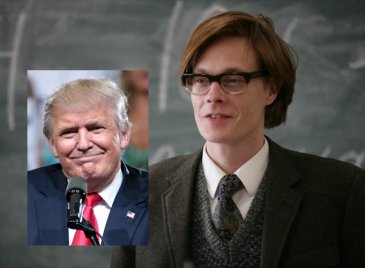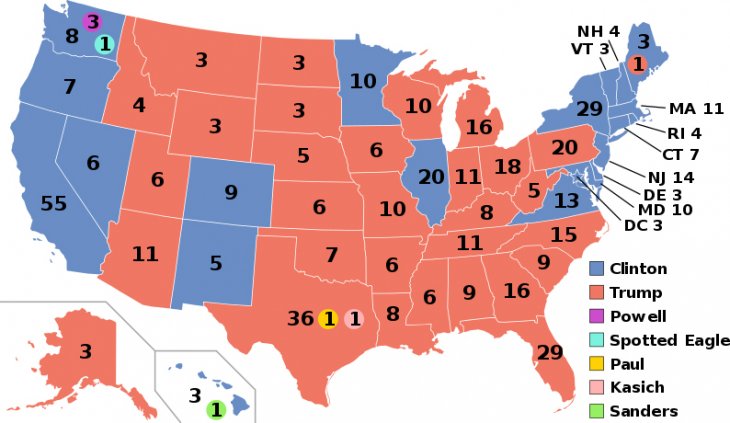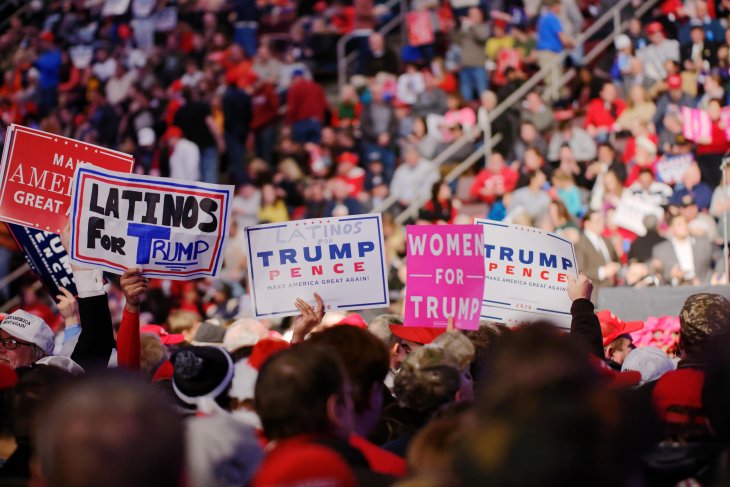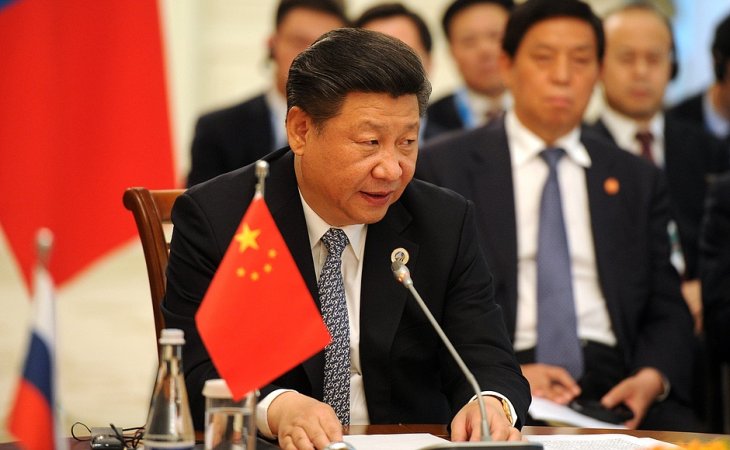Stein Tønnesson delivered this year’s The Fjord Memorial Lecture at Inland Norway University of Applied Sciences, Lillehammer. The lecture discusses Trump’s team of advisors, calls for fighting the increasing use of lies in political campaigning, sees Trump’s election as having weakened democracy worldwide, and perceives a major risk to world peace. Tønnesson ends the lecture with four scenarios for how Trump’s foreign policy may develop: chaos, status quo, lucky bargaining, or war.

Mr Fjord is a fictional character in a novel written by Norwegian author Dag Solstad. Mr Fjord was taught source criticism at the University but was persuaded to leave the path of truth when he became a member of a Marxist-Leninist movement. While Mr Fjord is a fictional character, Trump, who also has problems differentiating between truth and lies, actually exists. A similar character to Mr Fjord is the teacher Pedersen (Gymnaslærer Pedersen), here played by Kristoffer Joner.
Oh Mr Fjord, – it feels strange that you’re fictional while Donald Trump is real. You, the trainee reporter at the Norwegian local newspaper The Dawn [Dagningen]; the history student who learned how to practice source criticism and became a lecturer here at Lillehammer University College; who were converted to Marxism-Leninism, underwent self-proletarization and became a worker at Mesna Cardboard Factory; and ended up as a dad with a lawnmower; you seem almost like an old acquaintance. But in fact you’re a fictional character in Dag Solstad‘s Novel 1987.
Meanwhile Donald Trump, who seems a completely improbable film character, actually exists. That a self-important, ignorant billionaire and reality TV star, who is unable to distinguish between truth and lies and has little respect for human rights and democratic procedures, can have taken up residence in the White House seems like fiction. I have to pinch myself when I think about the American people giving Trump the nuclear button. Donald Trump and some of his closest advisers want to tear down the current order in the United States and the rest of the world in order to recreate the wealthy and powerful America of an imagined past: America First! Make America Great Again!
Trump’s speech
Mr Fjord, let me quote from Donald Trump’s inaugural address on 20 January this year. It tells us something about how he thinks:
“For many decades, we’ve enriched foreign industry at the expense of American industry; subsidized the armies of other countries while allowing for the very sad depletion of our military. We’ve defended other nation’s borders while refusing to defend our own, and spent trillions of dollars overseas while America’s infrastructure has fallen into disrepair and decay.
We’ve made other countries rich while the wealth, strength, and confidence of our country has disappeared over the horizon. One by one, the factories shuttered and left our shores, with not even a thought about the millions upon millions of American workers left behind. The wealth of our middle class has been ripped from their homes and then redistributed across the entire world.
But that is the past. And now we are looking only to the future. We assembled here today are issuing a new decree to be heard in every city, in every foreign capital, and in every hall of power. From this day forward, a new vision will govern our land. From this moment on, it’s going to be America First.
Every decision on trade, on taxes, on immigration, on foreign affairs, will be made to benefit American workers and American families. We must protect our borders from the ravages of other countries making our products, stealing our companies, and destroying our jobs. Protection will lead to great prosperity and strength. I will fight for you with every breath in my body – and I will never, ever let you down. America will start winning again, winning like never before.”
Trump surrounds himself with a group of advisers who were previously on the margins, because they were either rich businessmen who weren’t involved in politics, friends or loyal followers or Trump himself, members of the most extreme wing of the Republican Party, or even activists in small reactionary groups. In this lecture I will steer clear of American domestic politics and restrict myself to talking about what Trump may do to the rest of the world.
Trump’s administration
So let me start by presenting the key personnel involved in the Trump administration’s foreign policy (although of course many of them work with both foreign and domestic policy):
- Mike Pence (born 1959), vice-president, former governor of Indiana, ultra-conservative Republican who supported Ted Cruz’s bid to be the Republican Party’s candidate until Cruz withdrew. Pence became Trump’s candidate for vice-president. Pence will take over as president if Trump is forced to resign.
- Rex Tillerson (born 1952), Secretary of State, was CEO of ExxonMobil until his appointment. Some days before he took office, ExxonMobil entered into a contract with PetroVietnam concerning gas production on Vietnam’s continental shelf in an area that China (admittedly in contravention of international law) also asserts claims to. In a Congressional hearing two days after this contract was signed, Tillerson stated that the United States and its allies must be ready to prevent Chinese access to the artificial islands that China has built in the South China Sea. In other words, the United States has now linked itself to Vietnam’s oil interests at a ministerial level. Tillerson has already drastically weakened the influence of the State Department in Washington DC by letting some of the most experienced senior diplomats leave the service, and accepting deep cuts in the budget for diplomacy that was recently presented to Congress.
- General James Mattis (born 1950), retired general who served for four decades with the US Marines. Strong opponent of the deal with Iran that was signed during Obama’s presidency. Seen as a voice of reason. For example, he is opposed to torture (unlike Trump). Enormous experience of warfare. Will be listened to by allies of the United States and will be useful for Trump in any wars during his presidency.
- Michael Flynn (born 1958) initially appointed and then sacked as National Security Advisor when he was caught having lied to Vice-President Pence about a conversation with the Russian ambassador.
- General Herbert Raymond McMaster (born 1962), the National Security Advisor appointed to replace Flynn. Will, together with Secretary of Defense Mattis, bring a much stronger military influence to American foreign policy than has been usual. Interestingly enough, McMaster has published a book on the Vietnam War in which he claims that military leaders must be ready to oppose their political masters if the latter wage war in a reckless manner.
- Jared Kushner (born 1981), Trump’s son-in-law, real estate magnate, and now senior adviser with no previous diplomatic experience. Has set himself the goal of bringing peace to the Middle East, and plays a prominent role in a range of foreign policy issues, including preparations for president Xi Jinping’s visit to Trump’s guest mansion at Mar a Lago in Florida next month.
- Reince Priebus (born 1972), White House Chief of Staff, party stalwart, fund-raiser, and a former critic of Trump. Must now be loyal. Controls access to the Oval Office. May play a role in curbing Trump and exposing him to the influence of bureaucrats with real knowledge.
- Kellyanne Elizabeth Conway (born 1967), advisor and spokesperson. Has shown herself to have a relaxed attitude to the truth, and has become famous for her use of the expression “alternative facts”.
- Nikki Haley (born 1972), UN ambassador. A Sikh of Indian descent. The first woman to be elected Governor of South Carolina. A conservative Republican. Will be listened to in New York although she defends the Trump administration’s intention to cut US contributions. She has already several times claimed a continuity of US policies in areas where Trump has more than hinted at change.
- Stephen Miller (born 1985), senior advisor, right-wing activist. Mouthpiece for Trump’s criticism of the media and judicial system, which he has called “enemies of the people”.
- Stephen Bannon (born 1953), security advisor now with a permanent seat on the National Security Council (NSC). Formerly CEO of Breitbart News Network. An ideologue who believes that the United States is under threat from two main enemies: Islam and China, and that a precondition for creating something new is to first tear down the powers-that-be.
- Peter Navarro (born 1949), director of the newly created National Trade Council. Professor of Economics, but most interested in the military power balance between the United States and China. Author of three books and several films about the danger posed by China.
Some of the main characteristics of this group are lack of political experience, the mixing of commerce and politics, a strong military influence, radical right-wing activism, and power struggles between ideologues and bureaucrats. This combination has formed the basis for an impression of chaos, and this impression is strengthened by the fact that Trump sends such strong messages to the general public, primarily through Twitter, although he allegedly does not quite know how to use a computer himself.
How could Trump win?
What made it possible for such an unsuitable person to win the American presidential election? Much research will be conducted on this issue, and I will mention just a few factors. First let me emphasize that he won the election by a substantial margin. The winner of an American presidential election is not determined by the overall number of votes, but by the number of delegates at the Electoral College. Although more people voted for Hillary Clinton than for Trump, Trump in fact won 84 per cent of the US election districts. In general, Clinton won only in the largest and most populous cities, and that was the reason why she won the majority of votes, but only a small minority of delegates in the Electoral College.

Electoral college map for the 2016 United States presidential election. Illustration: Gage
The explanations for Trump’s election victory must include a combination of the facts that Clinton represented a prominent example of the despised establishment that Trump attacked so strongly, and that marginalized white American voters not only did not share in the economic growth that occurred under Obama but also bore an ethnic antipathy to Obama as a black president. Trump also won approval by attacking China again and again for stealing American jobs by maintaining a massive surplus in its trade balance.
Even so, the extreme nature of the election result continues to be astonishing. Russian hacking hardly played much of a role, even if the apparent leak of internal e-mails by a foreign government from the Clinton campaign is worrisome. For the main explanation of Trump’s victory, we must look at trends in the American media. The serious media have become less and less influential. Trump had an advantage because he was a popular TV personality, known to many people from hosting the reality TV show The Apprentice, where he appeared as a fatherly figure who exercised fairness in assessing people’s qualities and firing those who failed to measure up.
The use of social media
The Trump campaign also made extensive use of social media, where allegations are often not contradicted because the commercial logic is that social-media users get the news that they want to hear. Searches made by social-media users are registered, with the result that they are offered more of the same. This means that voters are often not exposed to contrary opinion, only views that reinforce their own. A person who seems to match the profile of a Clinton voter will get positive news about Clinton and negative rumours about Trump. But someone who seems to match the profile of a Trump voter will get the opposite. Voters who supported Trump had probably seen minimal information about the fact that he is a liar.

President Obama and Facebook CEO Mark Zuckerberg. Photo: GES
The Facebook CEO Marc Zuckerberg (who is scarcely likely to have voted for Trump) has with hindsight published a manifesto that promises a more balanced and responsible dissemination of news. The question is whether these are merely empty words because the whole Facebook system is permeated by marketing logic. It doesn’t allow for contradictions. A few large corporations, who have allowed basic marketing principles to dominate the dissemination of knowledge and the forming of opinions, now dominate communication on the internet, which was supposed to be so free. Wikipedia is a splendid exception, which deserves as much financial support as possible from donors who care about the knowledge society of the future.
In my opinion, Trump’s election victory should form the basis for a showdown not only with the role of marketing in politics, but also with the undermining of respect for the truth and the effects this has had on democracy.
The need for a positivist renaissance
It is time to re-establish respect for verifiable truths: the respect that prevailed in the age of positivism and that still prevails in the natural sciences. I don’t think that it is only the development of new media that has given rise to the spread of rumours and lies, but that it also has something to do with the endless nit-picking we have been hearing from intellectuals for many years now about truth not existing, about truth being relative, and about how distinguishing between actual truth and lies is trivial or uninteresting. That brings me back to you, Mr Fjord, because you became a victim of this nit-picking in its Marxist phase. But first let me emphasize that Trump has brought mendacity in politics to a new level.
His lying was a major topic during the election campaign, but still did not prevent him from getting elected
Former American presidents have also been liars, of course. Richard Nixon said he was not a crook. Ronald Reagan said that he didn’t know about the Iran-Contra agreement. Bill Clinton said that he hadn’t had sex with “that woman”. But these presidents were damaged when they were caught lying. They tried to stop their lies being uncovered. Trump is not affected at all. As Politico magazine wrote in its first issue this year, the frequency, spontaneity and apparent irrelevance of Trump’s lies are something new. Politico found that 70 per cent of Trump’s statements during the election campaign were false. Trump seems to attach no significance at all to whether what he says is factually correct or not. His lying was a major topic during the election campaign, but still did not prevent him from getting elected. Either it had no significance for his voters, or they never actually had access to the information that Trump is a prolific liar.

Women’s march 2017. Photo: Mark Dixon
Trump’s own mendacity has of course allowed others in his administration, such as Kellyanne Conway, to adopt the same unscrupulous practices. Ironically, Trump used a speech to the Conservative Political Action Conference in Washington, DC, on 24 February to denounce “fake news”: “And I want you all to know that we are fighting the fake news. It’s fake, phony, fake. A few days ago I called the fake news “the enemy of the people.” And they are. They are the enemy of the people. Because they have no sources. They just make them up when there are none.” It would seem, however, that what Trump considers “fake news” is actually inconvenient facts or hostile interpretations of his statements. He is in the habit of drawing attention away from his own weaknesses by launching strongly worded accusations against others.
My hope is that the mendacity that is now in evidence in the White House will trigger a reaction, and it is at this point that I return to you, Mr Fjord. When you were studying history at the University of Oslo in the late 1960s, you learned about the basic principles of source criticism, but then you attended the Nordic Methodology Conference in Mariehamn in 1971 and met young critical theorists who thought that source criticism had prevented historians from addressing major historical issues. According to them, historians were bogged down in the kind of small, irrelevant matters that are possible to investigate through historical source criticism. Yes, there was something in that criticism, but that was just your first step away from the path of truth. Here at Lillehammer, when you were a lecturer at the University College, you came under the influence of people who persuaded you to adopt a class-based position, seeing working-class truth as something different from middle-class truth. The result was that you left the University College and got some good experiences as a worker in a cardboard factory, but at the same time you helped – both on your own account and through the author Dag Solstad – to erase the distinction between fiction and reality.
The problem with relative truth
After Marxism came Postmodernism. No reality exists out there, because nothing can exist unless a human brain perceives it. The back of a tree can’t be sensed. We only have an idea about it. Truth arises inside the human head and is disseminated through our influence on others. Accordingly, truth is relative. What no one sees or says does not exist. Then came Constructivism and Deconstructivism. All over the world, university students’ dissertations in social sciences and the humanities were filled with socially constructed realities, speech acts, narratives and discourse analyses. This brought out much interesting research about the impact of language, ideas and thought patterns on historical processes and decisions, but many scholars and students did not accept or realize that the speech acts and ideas of the past must be documented just as rigorously as decisions and material change. Factual scholarly statements about speech acts in the past must be correct, and if they are claimed to have had an impact on human behaviour this must be demonstrated through causal analysis.
It should be a requirement for non-fiction writing that it distinguishes between factual information and assumptions, and that literary fiction does not hide its fictitiousness
In the field of literature, there was strong support for abandoning the distinction between fiction and non-fiction. Fortunately, this is still controversial. It should be a requirement for non-fiction writing that it distinguishes between factual information and assumptions, and that literary fiction does not hide its fictitiousness. Fiction can be an excellent tool for grappling with the most important aspects of the evolution of human society, and artists are probably at the forefront when it comes to sensing new developments, but in non-fiction, the writer’s imagination must be curbed and used only to develop hypotheses and theories about causation.

All over the world, university students’ dissertations in social sciences and the humanities have been filled with socially constructed realities, speech acts, narratives and discourse analyses, at the expense of sound source criticism. Photo: Jirka Matousek
Several generations have now grown up with a relative attitude to truth. This has affected source criticism and fact checking, and it is reasonable to imagine (here I am speculating about the connection) that relativism has contributed to making it less difficult for politicians to lie. In any event, I think we would benefit from a positivist renaissance. Fortunately, traditional source criticism is still being taught in history faculties and institutes. Source criticism is the historical discipline’s great methodological contribution to all forms of research in the humanities and social sciences, and also to journalism, police investigation and social planning.
Let me add here that I have reviewed some of President Barack Obama’s speeches and been deeply impressed, not only by their rhetorical quality, but also by the thorough preparation that was done to ensure that the speeches were based on factual knowledge. Obama, with his understanding of the significance of shifting and overlapping identities, was also a president who had a great respect for factual truth.
Democracy is not just about elections
Trump’s election victory should lead to a new round in the debate on democracy. I’m not asking for more arguments to the effect that US intellectual elites have been arrogant and have failed to understand the sentiments of ordinary Americans. The elites may in many ways be at fault, but the American voters made a big mistake when they saw Trump as someone who could do something effective to rectify the huge inequalities and injustices in the American society. One of the starting points for the debate should be that voters in the world’s second largest electoral democracy are capable of making a fundamentally erroneous choice. There is something rotten in the American political system.
The elites may in many ways be at fault, but the American voters made a big mistake when they saw Trump as someone who could do something effective to rectify the huge inequalities and injustices in the American society

One of the starting points for the debate should be that voters in the world’s second largest electoral democracy are capable of making a fundamentally erroneous choice. Photo: Micheal Vadon
Democracy depends on rational debate about verifiable facts, based on different values. It must be possible to present factual circumstances across political divides in ways that make it possible to discuss the same thing. At a time when voters are constantly exposed to increasingly overwhelming and sometimes imperceptible opinion-forming messages through the use of highly sophisticated and entirely new marketing techniques (see this incredibly scary article about how “psychometrics” were used to customize messages to American voters with the intention of either getting them to vote for Trump or not to turn out to vote for Clinton), democracy’s only, or main, institution cannot be a direct presidential election. Democracy is about representation and about decisions taken on the basis of exchanges of opinion; it is not about mobilizing votes with devious, mendacious marketing tailored to have a psychological impact on each individual voter through social media.
After the election of Trump, we have seen the importance of the fact that American democracy rests on the principle of separation of powers. Trump has not got his way with his attempt to prevent Muslims entering the United States, but the erosion of bipartisan policy making and a lack of cooperation between the majority in Congress and the president have weakened representative democracy in the United States. There has been far too little opportunity for a normal political process involving the enactment of new, thoroughly debated legislation. Obama’s only major reform (the healthcare reform) is now at risk of being replaced by a system that is significantly worse.
A parliamentary democracy, as we have in much of Europe, is far preferable. We don’t elect the government directly. We elect our MPs, and each party’s strength in parliament determines who forms the government. The parliament can topple a government. In most European countries, it fortunately remains important for politicians not to be caught telling lies.
Democratization of the world
The democratization of the world has happened in three waves, each followed by a backlash. The first long-lasting wave began in the 19th century and lasted well into the 20th. The backlash came in 1922 and lasted for 20 years. The second way of democratization came after World War II and continued into the early 1960s. That wave encompassed Japan and the world’s largest democracy: India. Then came a new backlash. The third wave from 1974 was strong and comprehensive. All of Europe to the west of Belarus, most of Latin America, many countries in Africa, and some new countries in Asia (South Korea, Taiwan) introduced democratic forms of government. Since 2001 we have been experiencing a new backlash. For a while, we thought that the Arab Spring would lead to a new democratic advance, but that was not to be the case.
The fluctuating strength of democracy can be seen in the likelihood of the People’s Republic of China following Taiwan’s example and transitioning to democracy. It nearly happened in 1989. Later there were experiments with democratic elections at grassroots levels, and there were periods of greater freedom. Today democracy, or at least the American form of democracy, does not much tempt the Chinese. Xi Jinping has encountered only feeble protests as he has made his government more and more authoritarian.
Democracy is being challenged today not only because the sovereignty of the nation state has been weakened by economic and cultural globalization, something which has provoked popular reaction in the form of varying degrees of aggressive nationalism. It is also being challenged by the facts that democratically elected leaders are being ousted by military coups in important countries such as Egypt and Thailand, and that democratic elections have brought undemocratic leaders to power in even more important countries such as Russia, Turkey, Hungary, Poland, and of course now in the United States.
Fortunately, we have already seen signs of a popular mobilization based on liberal social values in defence of rights and freedoms, and against abuses of power and increasing social inequality
Fortunately, we have already seen signs of a popular mobilization based on liberal social values in defence of rights and freedoms, and against abuses of power and increasing social inequality. Old party divides will become less important in an age when the main goal is to prevent the election of more leaders of Trump’s calibre. The elections in the Netherlands on March did not produce any major swing towards anti-immigrant populism. When the French voters are called upon to elect their new president in April and May, we could see a vast mobilization to defeat Marine Le Pen and give a decisive victory to a responsible centrist politician.
The risk of war
One of the worst aspects of the new Trump administration is its reliance on strong hostile images and apparent preparations for new wars. Many of its leading figures were critical of Obama’s military restraint in Syria and hostile to his nuclear deal with Iran. Trump has chosen experienced military generals for the positions of Secretary of Defense and National Security Advisor, and has presented a budget proposal to the US Congress with an almost 10 per cent increase in the military budget, to be financed by deep cuts in the budgets financing diplomacy, research, culture and federal social programs. Trump has not yet followed up his anti-China rhetoric and threats of a trade war from his presidential campaign but has instead allowed his administration to prepare the ground for a meeting with Xi Jinping in April at his own commercial beach resort in Florida. That meeting may tell us something about where Trump’s foreign policy is heading. He is strongly committed to doing something to reduce the Chinese surplus on the balance of bilateral trade to must demonstrate to this voters that he has succeeded. He might follow up his effort by seeking to demonstrate to China that the United States remains the leading military power in the Western Pacific. His increases in the federal military budget aim to strengthen the US nuclear forces and build an additional aircraft carrier. Trump’s key foreign policy advisors think that Obama’s efforts to increase the American presence in areas close to China through a so-called “pivot” were too cautious. There is good reason to think that the risk of a serious crisis or the outbreak of war between the United States and China has increased following the election of Trump.
There is good reason to think that the risk of a serious crisis or the outbreak of war between the United States and China has increased following the election of Trump

President of People’s Republic of China Xi Jinping.
The first effect of Trump’s assumption of power has been worldwide insecurity. This has already lead to some important shifts, such as the fact that China, a one-party dictatorship, appears more responsible and amenable to globalization than the United States, a democracy. Xi Jinping travelled to the annual World Economic Forum in Davos just before Trump’s inauguration and gave a speech about the importance of free trade that could have been given by any former American president: “We should commit ourselves to growing an open global economy . . . No one will emerge as a winner in a trade war.”
Four possible scenarios
I see four possible scenarios for the world’s further development under Trump: chaos, status quo, diplomatic success, or war. Unfortunately, I consider the war scenario to be the most likely.
In the first scenario, there will be a continuance of the chaos that has characterized the White House until now, with further ill-considered initiatives and further power struggles between Trump’s advisors. This will prevent the development of a clear foreign policy. It will instead be feeble and vacillating. The United States will lose influence internationally, and be taken less seriously than before. This will create enormous new opportunities for China, which – if Xi Jinping chooses to exploit them – will gain a strong position that may challenge the status of the United States as leading world power. Large parts of the world (but not Japan) could see China as a more reliable partner than the United States. In this scenario, Trump will of course encounter ever-greater problems at home. He may be forced from power so that the United States will have a Pence administration instead. The ultra-conservative vice president has already taken on the role of the more responsible politician, e.g., when representing the USA at the latest NATO summit in Europe.
In the second scenario, the bureaucracy succeeds in taming Trump, such that the United States can conduct its traditional foreign policy. He will learn that foreign policy isn’t something to be conducted on Twitter, that reactionary ideologues have no place on a National Security Council, and that foreign policy initiatives must be thoroughly considered and prepared. In this scenario, the result will be the same policy as before: NATO is important; the EU will be encouraged to hang in there; America’s alliances in Asia will be essential, with Japan as a cornerstone; Russia will be kept at arm’s length; and the rivalry with China will be managed in a way that avoids direct confrontation. Direct war with Iran will also be considered as too dangerous, and it will be considered too risky to launch a military attack on North Korea. The two senior military figures in Trump’s circle, Secretary of Defense Mattis and National Security Advisor McMaster, along with responsible Republicans in Congress, such as Senator John McCain, may be able to help bring about such a scenario. Trump can be tamed and become a circus pony. The problem is that this will not allow him to be re-elected. Hence this scenario is neither politically attractive to himself nor to the many personal friends he has brought with him to the White House.
In the third scenario, Trump lucks out. He becomes the new Reagan. Reagan contented himself with attacking minor countries such as Grenada, and terrorizing the Soviet Union with his “star wars” defense system. Trump is a businessman, not a warrior. Most of his books are about how to become super-wealthy, and the most famous – The Art of the Deal – is about negotiating. He sees himself as an expert negotiator. Perhaps he will sit himself down with Kim Jong Un and eat a hamburger, as he said he could in his campaign for the Republican nomination. And then they’ll agree a peace deal whereby the United States recognizes North Korea, establishes full diplomatic relations, and young Kim promises not to detonate any more nuclear tests or fire any more missiles. Then Kim comes to visit Trump. They watch basketball together each wearing their team’s cap, and South and North Korea start trading with each other again. Xi Jinping is genial and sits down with Trump to agree how they can balance trade between the United States and China so that China buys more American goods and invests in American jobs. They find a win-win solution, and the world gives three cheers. Then, when the world looks more kindly on Trump, he may also look more kindly on the rest of the world, and be re-elected in a landslide. Unfortunately, this is the least likely scenario. If you believe in it, you’re a real optimist.
In the fourth scenario, Trump becomes a wartime president. In a way, he already is, since he inherited wars from George W. Bush and Obama, but Trump is not in the least interested in the longest war that the USA has ever fought, that in Afghanistan. He never talks about it. He sees war as something different from the Middle Eastern quagmires. He wants a kind of war that America wins: On 27 February he told a group of US governors that the US had squandered trillions of dollars on military operations in the Middle East over the past two decades without winning any of the wars. “We never win, and we don’t fight to win … We’ve either got to win, or don’t fight it at all.” Trump said his new budget would send “a message to the world” about America’s strength and resolve. He wanted to provide soldiers with the tools to deter war and, when called upon, “to start winning wars again.” There won’t be war with Russia, but there could be war with Iran or North Korea – or directly with China. And if the US goes to war with Iran or North Korea, this would be seen as part of the US rivalry with China.
War is the most likely scenario
Why do I think that war is the most likely of the four scenarios? There are five reasons.
First, fear in the United States about China’s increasing power has been growing for a long time, even among sensible Americans, completely independently of Trump and the group around him. I would have feared an acute Sino-US crisis about how to tackle North Korea also if Clinton had become president.
Second, several of Trump’s advisors have spoken openly about the necessity of preparing for war with China, because China has become too powerful.
Third, the US Secretary of State’s oil company has become Vietnam’s partner in the South China Sea (although this may encourage China to be cautious about pushing its dispute with Vietnam). Fourth, the American president is the supreme commander of the country’s armed forces and is fully entitled to conduct a war for up to 90 days without having to consult Congress.

Svein Tønneson is a Research Professor and former Director of PRIO. Photo: PRIO / Julie Lunde Lillesæter
And finally, Trump has chosen to have two former military generals as National Security Advisor and Secretary of Defense, one from the army, the other from the US Marine Corps. Both have a solid battle experience. Their familiarity with the realities of war may encourage them to help Trump avoid new wars. This is true and very important. But their military expertise will also make them particularly useful to Trump if and when he decides to go to war. Last year, the RAND Corporation published a study, commissioned by America’s top generals, titled “War with China: Thinking through the unthinkable.” It described how a war with China would pan out. The war would not be brief, but would last for up to a year. It would consist of the reciprocal destruction of weapons platforms: ships and submarines, aircraft, missile bases, and satellite systems, but it would not be fought by ground troops. The United States would win, but with huge losses, and China’s economy would be destroyed. Building on highly questionable assumptions, the report suggests that the conflict would not escalate to a nuclear war.
Stephen Bannon said in March 2016: “We’re going to war in the South China Sea in five to 10 years … There is no doubt about that”. In December–January 2016–17, China’s first aircraft carrier circumnavigated Taiwan, participating underway in exercises in the South China Sea in order to demonstrate China’s growing military strength. Several more Chinese aircraft carriers are under construction. In February, the US responded by sending one of its aircraft carriers into the South China Sea. Trump’s trade advisor, Peter Navarro, who is now probably working at full tilt on Trump’s strategy for tackling China, has written three books with the telling titles The Coming China Wars: Where They Will Be Fought, How They Can Be Won (2006), Death By China: Confronting the Dragon—a Global Call to Action (2011) and Crouching Tiger: What China’s Militarism Means for the World (2015). I have read this last book, and it sent shivers down my spine.
Trade war vs military war
There is so much that may prevent the US from conducting a successful trade war against China. Nearly every possible measure that America could take would adversely affect both countries. China’s currency is in fact no longer undervalued. Duties on imports from China will lead to inflation that will hit poor people in the United States, including Trump’s voters. China may react by selling its enormous holdings of American securities. America’s transnational companies will be hit if they can no longer produce goods in China or have access to the Chinese market. They will resist Trump in many ways if he opts for a trade war. It is a likely hypothesis that Trump does not want to get advice from expert economists on Sino-US economic relations, since virtually any expert will tell him how difficult it is to “win” a trade war. It took Trump more than two months from his inauguration before he appointed members of the President’s Council of Economic Advisors.
It is so much easier to start a military war. The only thing that matters is being ready for escalation when the crisis comes. Perhaps that is why the protectionist economist Navarro writes so much more in his books about military matters than about trade, investment and exchange rates. Perhaps we can find consolation in the fact that China, once Trump was elected, finally decided to allow Trump to sell his brands on the Chinese market. If Trump’s businesses now gain lucrative shares of the market in China, it may encourage him to adopt a more conciliatory policy towards China. From a purely ethical perspective, this mixing of foreign policy and business interests is of course indefensible, but we’re talking about Trump, so Beijing no doubt know what they are doing.
Yes, Mr Fjord, I see you furrowing your brow. Hopefully you have some good objections to my growing pessimism on behalf of our world. I have spent the last six years attempting to understand how East Asia has managed to develop peacefully since the 1980s. From 1946 to 1979, East Asia accounted for 80 percent of battle-related deaths worldwide. During the 1980s this fell to 6.2 percent, and since 1990 the figure has been 1.7 percent, according to estimates from Uppsala University. Thirty percent of the world’s population live in East Asia. The peace has allowed them to experience an enormous improvement in living standards, with drastically increasing life expectancy. Now it seems to me that this may soon be over.
Mr Fjord, can I come and visit when Trump and Xi have their first summit, and enter into the fiction that you and I are old acquaintances – if you are not too busy mowing the lawn? That way we can furrow our brows together in front of the television and discuss source criticism.
- Translation from Norwegian: Fidotext